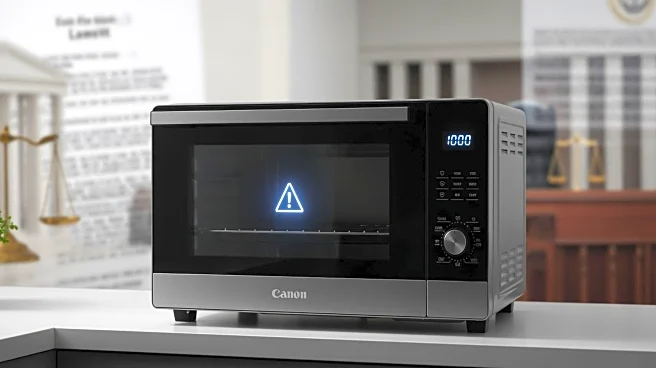What's Happening?
A federal lawsuit has been filed against Newell Brands Inc., challenging the adequacy of its recall remedy for over 1 million countertop ovens. The lawsuit, initiated by Monica Corbett in the U.S. District
Court for the Eastern District of New York, claims that the repair kit provided by Newell Brands does not adequately address the burn hazard posed by the ovens. The U.S. Consumer Product Safety Commission had previously issued a recall notice, citing the risk of the oven doors unexpectedly closing and causing burns. The lawsuit argues that the clip-on device offered as a fix fails to resolve the underlying defect, raising concerns about corporate accountability and consumer safety.
Why It's Important?
The lawsuit against Newell Brands highlights significant issues regarding corporate responsibility and consumer protection following product recalls. With over 1.29 million ovens recalled, the outcome of this case could influence how manufacturers address safety risks and the expectations consumers can have when a recall remedy is deemed insufficient. The case underscores the importance of effective recall solutions and the potential legal consequences for companies that fail to ensure consumer safety. It also raises broader questions about the limits of federal oversight and the adequacy of voluntary recall remedies.
What's Next?
Newell Brands is expected to respond to the lawsuit, either by filing an answer or a motion to dismiss. If the case proceeds, the court will consider certifying it as a nationwide class action, potentially involving millions of oven owners. The legal process will include discovery, where both parties exchange internal documents related to design, safety data, and recall communications. The case may settle before trial, but if not, a jury trial could follow, potentially setting a precedent for how companies handle post-recall remedies and consumer safety obligations.
Beyond the Headlines
The lawsuit against Newell Brands raises ethical and legal questions about the adequacy of recall remedies and corporate accountability. It challenges the notion of whether offering a partial fix through a repair kit satisfies a company's duty to ensure consumer safety. The case also highlights the broader implications of product recalls, including the financial and reputational risks for companies that fail to address safety concerns effectively.









